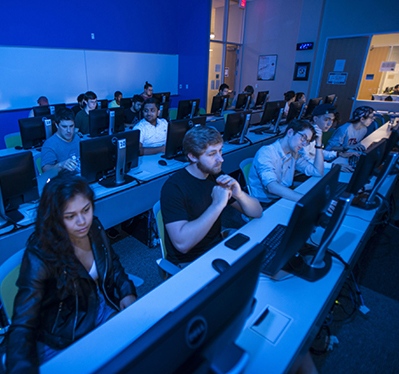Posted on September 7, 2022 by Wendy Frost
 “This is a next generation degree program,” said Nicole Beebe, chair of the Department of Information Systems and Cyber Security in the Alvarez College of Business. “By training students in both cyber security and analytics, we are addressing a need in the industry that hasn’t even been acknowledged yet. In 20 years society will look back at the launch of this degree program and realize how innovative we were in establishing it.”
“This is a next generation degree program,” said Nicole Beebe, chair of the Department of Information Systems and Cyber Security in the Alvarez College of Business. “By training students in both cyber security and analytics, we are addressing a need in the industry that hasn’t even been acknowledged yet. In 20 years society will look back at the launch of this degree program and realize how innovative we were in establishing it.”
Students will gain an understanding of the cyber domain and its unique datasets and business intelligence needs. Utilizing tools such as machine learning and artificial intelligence, they will learn how to interpret patterns in cyber detection and obtain high-demand skills in the areas of cloud security, risk management and threat intelligence.
“The cyber security industry is suffering from a massive gap in this area,” said Mark Manglicmot, senior vice president of security services at Arctic Wolf and chair of the college’s Cyber and Analytics Board of Advisors. “This degree will allow students to get hands-on experience in how to operate in a cyber security domain while also applying machine learning techniques to large data sets to find the most sophisticated attackers.”
Choosing to attend UTSA because of its nationally recognized cyber security program, transfer student John Ellis is one of the first students majoring in the applied cyber analytics program. With a strong technical background, he was encouraged to join the program by faculty member Rita Mitra.
“I took a coding class in high school and fell in love with it,” said Ellis. “It complements the way my brain works. I love how it is like solving a puzzle. I’m loving it here. I’m eager to gain a deeper understanding in the field and see how it all comes together.”
Focusing on the applied aspects of analytics, students will understand when to use certain algorithms as well as why they are appropriate. They will take the same required courses as the current B.B.A. in Cyber Security, along with additional cyber security and data analytics courses. Supporting coursework includes the fields of mathematics, statistics, business analytics, information systems, data mining, machine learning, policy, law and ethics.
According to the U.S. Bureau of Labor Statistics, there will be a 31% increase in demand for workers trained in cyber security in the next decade.
“This degree opens a multitude of roles for students,” said Joey Jablonski, vice president of analytics at Pythian and vice president of the Cyber and Analytics Board of Advisors. “They could do a traditional cyber security role or join a risk management organization that handles large, complex data sets trying to identify outlier or adverse behavior and alerting individuals to take actions.”
UTSA is the No. 1 cyber security program in the nation according to the Ponemon Institute. Named a Center of Academic Excellence in Information Assurance/Cyber Defense Education, Cyber Operations and Information Assurance Research by the National Security Agency and the Department of Homeland Security, UTSA excels in both cyber academic programming and research. The Alvarez College of Business offers a B.B.A. in Cyber Security both online and in person as well as a M.S. in Information Technology degree with a concentration in cyber security and a Ph.D. in Information Technology with a concentration in cyber security.

